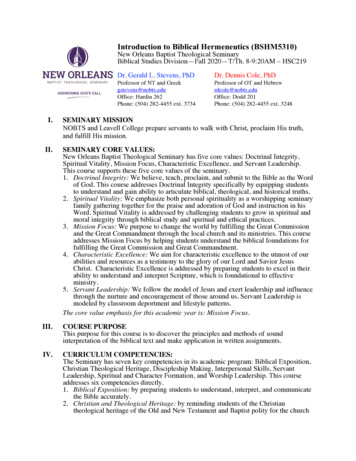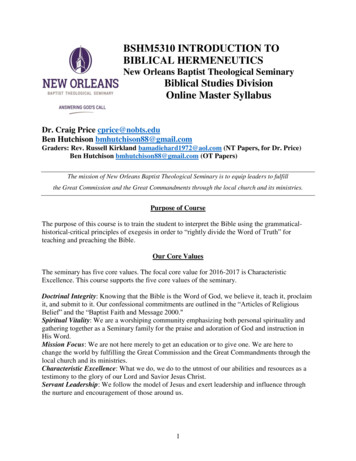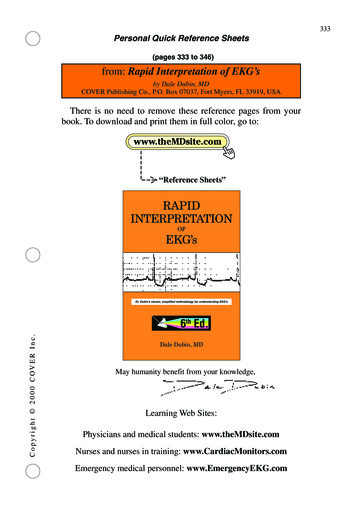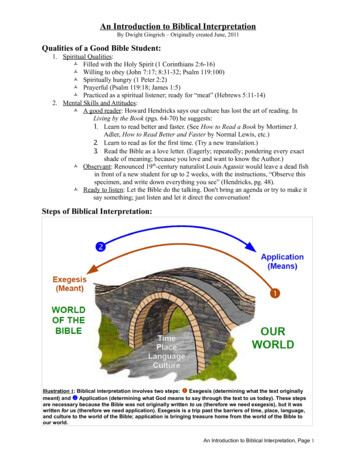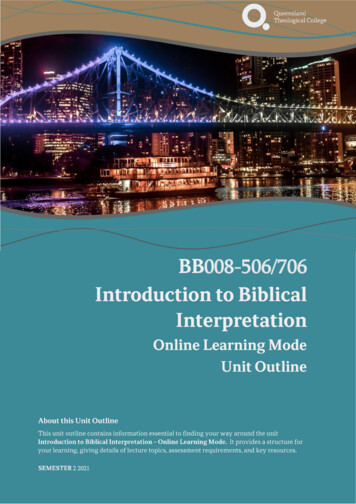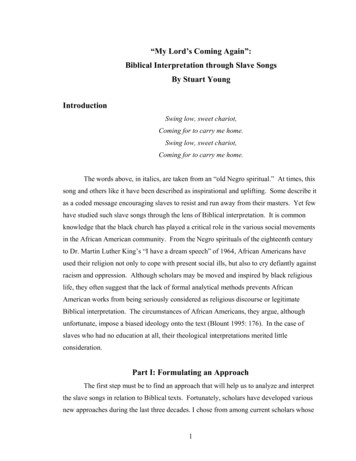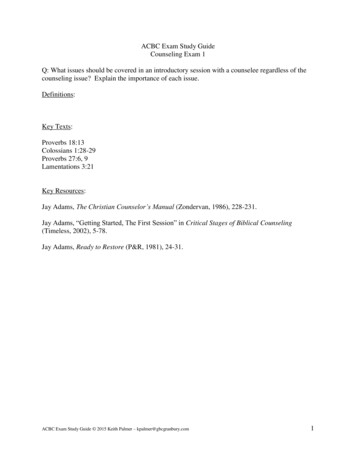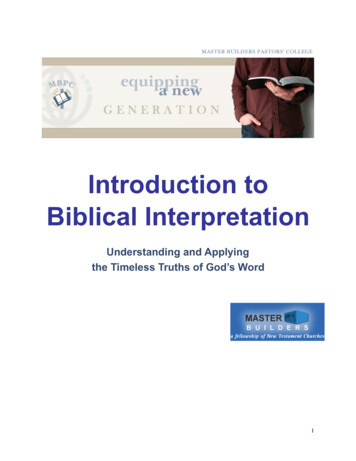
Transcription
Introduction toBiblical InterpretationUnderstanding and Applyingthe Timeless Truths of God’s Word1
Introduction to Biblical InterpretationCourse IntroductionThis course will present a brief overview of the different literary styles of theBible, seeking to get a grip on the Bible as a whole while emphasizing theinterpretive guidelines for each major section. We will learn the difference betweenexpository and inductive study and learn to employ good exegesis andhermeneutics in order to properly interpret what the writer is saying and how itapplies to us today. We will also learn to recognize how all of the scriptures pointto Jesus.A syllabus is provided that contains pre-reading assignments for each audiolecture. There are also assigned exercises that help the student practice with theprinciples and skills learned in the sessions. These assignments are to be submittedto the instructor via email. While this is essentially a self-study, I will be availablefor discussion and questions. Please do not hesitate to contact me.Mark MedleyTrinity Chapel5830 Haynes Sterchi RoadKnoxville TN 37912865-688-9991 (church)865-406-4487 (cell)medleymail@frontiernet.net2
Principles of Biblical InterpretationSyllabusRequired Texts: 1) How to Read the Bible for all its WorthBy Gordon Fee and Douglas Stuart2) The Holy BibleInstructor: Mark MedleyCourse Dates: January 3 - March 13, 2010Session One:Pre-read Preface and Chapters 1 and 2/ No assignmentA Brief Overview of the BibleIntroduction to ExegesisIntroduction to HermeneuticsSession Two:Pre-read Chapters 3-6 / Assignment One, page 11: MemorizationUnderstanding the EpistlesUnderstanding Old Testament NarrativesUnderstanding The ActsObservation, Interpretation, ApplicationSession Three: Pre-read chapters 7-8 / No AssignmentUnderstanding the GospelsUnderstanding the ParablesLearning how to ReadSession Four:Pre-read chapters 9-10 / Assignment Two, page 17 (Due May 5)Assignment Three, page 20 (Due May12)Understanding the LawUnderstanding the ProphetsLearning to ObserveSession Five:Pre-read chapters 11-12 / Assignment Four, page 23 (Due May 19)Understanding the PsalmsUnderstanding Wisdom LiteratureLearning how to InterpretSession Six:Pre-read chapter 13 / Final Assignment, page 59 (Due June 9)Understanding The RevelationSteps to ApplicationComplete all assignments at the end of each session (sessions 2-6). Your final assignment will be acomprehensive exegesis and hermeneutics assignment involving a portion of scripture chosen by you, andapproved by the instructor, utilizing all skills learned in the class.3
Principles of Biblical InterpretationSession One NotesA Brief Look at the Book — The Bible Has No Equal Written over a 1500 year span (over a span of forty generations) Written by over 40 different authors from all walks of life: Moses, a political leader trained in Egypt Peter, a fisherman Amos, a herdsman Joshua, a military general Nehemiah, a cupbearer Daniel, a prime minister Luke, a doctor Solomon, a King Matthew, a tax collector Paul, a rabbi Written in different places Moses in the wilderness Jeremiah in a dungeon Daniel on a hillside and in a palace Paul, inside prison walls Luke, while travelling John on an island of exile Others in the rigors of a military campaign Written at different times Times of war, peace, prosperity, bondage of slavery, hope, hopelessness,heights of joy, depths of despair, victory, defeat, etc. Written on three continents Asia Europe Africa Written in three different languages Hebrew (most of the Old Testament) Aramaic (a small portion of the Old Testament) Greek (the New Testament)4
The Bible has No Equal (cont.) Written in many different literary styles Prophecy Historical narratives Poetry Wisdom Literature Apocalyptic Literature Letters to churches and friendsAlthough there are many subjects in the Bible which would create opposingopinions when mentioned and discussed, especially across time and in differingcultures, still there is one unfolding story, one main theme in all the Old and NewTestaments: “God’s redemption of man.” The Bible has been read by more people and translated into more languages than any otherbook in history (thousands of languages and dialects now have portions, testaments or thecomplete Bible in their own language) Although written on perishable material, and being copied and recopied for hundreds of yearsbefore the invention of the printing press, the Bible, compared to other ancient writings, “hasmore manuscript evidence than any 10 pieces of classical literature combined.” The Jews had special classes of men who’s sole job was to perfectly preserve andtransmit these documents from one generation to the next. The Bible is amazingly honest about the humanness of its characters. It shows the good, thebad, and the ugly of even its heroes. One man said, “The Bible is not such a book a manwould write if he could, or could write if he would.” The Bible doesn’t gloss over the sins ofits characters nor does it try to paint them as saints. It simply tells it like it is. The Bible has stood the test of time and the attempts of godless men to stamp it out.“Voltaire, the noted French infidel who died in 1778, said that in one hundred years fromhis time, Christianity would be swept from existence and passed into history. But whathas happened? Voltaire has passed into history, while the circulation of the Biblecontinues to increase in almost all parts of the world, carrying blessing wherever itgoes Concerning the boast of Voltaire only fifty years after his death the GenevaBible Society used his press and house to produce stacks of Bibles.” The Bible has had an incredible influence on surrounding literature. “If every Bible in anyconsiderable city were destroyed, the Book could be restored in all its essential parts from thequotations on the shelves of the city public library.”5
What Really Sets the Bible ApartHebrews 4:12 – For the word of God is living and active. Sharper than any double-edged sword,it penetrates even to dividing soul and spirit, joints and marrow; It judges the thoughts andattitudes of the heart.2 Timothy 3:16-17 – All scripture is God-breathed and is useful for teaching, rebuking,correcting and training in righteousness, so that the man of God may be thoroughly equipped forevery good work.1) “All Scripture” -2) “God-breathed” Gk. theopneustos –3) Teaching Gk. didaskalia –4) Rebuke Gk. elegmos –5) Correction Gk. epanorthosis –6) Training Gk. paideia –7) The Goal6
Eternality of the ScripturesPsalm 119:89 – Forever, O Lord, thy word is settled in heaven.Isaiah 40:8 – The grass withers, the flower fades: but the word of our God shall stand forever.Matthew 5:18 – I tell you the truth, until heaven and earth disappear, not the smallest letter, notthe least stroke of a pen, will by any means disappear from the Law until everything isaccomplished.Matthew 24:35 – Heaven and earth will pass away, but my words will never pass away.Enlightenment from the ScripturesPsalm 119:130 – The entrance of thy words gives light; it gives understanding to the simple.The Bible is:Joy to the heart, light to the eyes, a lamp to the feet, a light to the path, a hammer, the sword thatthe Spirit wields, a more sure word of prophecy, it cleanses our way, it sanctifies us, it producesfaith, causes us to believe, it is hope and comfort and there is eternal blessing tied to the hearingand obedience of it.In light of all of this, 1 Peter 2:2 says: “As newborn babes, long for the pure milk of word, that byit you may grow in respect to salvation. “The ultimate aim of Bible Study:1)2)7
How are we to approach this incredible book?Picking and choosing a verse or passage here or there can result in shallowness,superficiality and error. God can speak through individual verses, but maturity comes throughstudying whole passages, whole books and how they relate to the book as a whole. This givesdepth and richness to all of our Christian life. So, it is good to get a grip on the Bible as a whole.There are many different ways of study: historically, topically, biographically, asliterature, etc. But we want to learn to study it expositorily or inductively. What is the messageof each book? What is the special significance of each book? We want to let each book tell it’sown story.We approach the Bible not merely as literature, but as the Word of God, from cover tocover. We must watch in the following areas if our study of the Bible is to be effective:1) We must not become so fascinated by the that we forget the2) We want to get a hold of the broader meanings of scripture, but unless the broadermeanings , our study has failed.3) Jesus himself has told us that is the theme of the scriptures (John 5:39-40).Therefore, we must see beyond the written Word to get a view of Him Who is theLiving Word. True Bible study will reveal Jesus in ever-increasing degrees.8
An Overview of the Books of the BibleOld Testament3917517HistoricalWisdomProphetic5 – Moses(Historical)12 – JoshuatoEsther(Historical)5 -- Job toSong of Solomon(Personal andexperiential)5 – Major ProphetsIsaiah to Daniel12 – Minor ProphetsHosea to Malachi30 writers, 1200 years, one theme:“God’s Redemption of mankind as seen inHis Covenant with Israel through Abraham.”9
New Testament275Historical (Matthew to rewChristianPrinciples(Romans to2 Thessalonians)(1 Timothyto Philemon)(Hebrews toRevelation)Romans: Christ the only wayHebrews: Christ the better way1&2 Thess:Christ’s return as itrelates to the ChurchRevelationChrist’s return as itrelates to Isreal10 writers, nearly 100 years, one theme:“God’s redemption of mankind as seen inHis Covenant with the world through Jesus.”10
The Old Testament by SectionsTHE BOOKS OF THE LAW - Genesis,Exodus, Leviticus, Numbers, DeuteronomyTHE BOOKS OF HISTORY - Joshua,Judges, Ruth, 1 and 2 Samuel, 1 and 2Chronicles, 1 and 2 Kings, Ezra, Nehemiah, EstherTHE BOOKS OF POETRY (WISDOM) -Job, Psalms, Proverbs, Song of Solomon,EcclesiastesTHE MAJOR PROPHETS - Isaiah,Jeremiah, Lamentations, Ezekiel, DanielTHE MINOR PROPHETS - Hosea,Joel, Amos, Obadiah, Jonah, Micah, Nahum,Habakkuk, Zephaniah, Haggai, Zechariah, MalachiThe New Testament by SectionsTHE BOOKS OF HISTORY - Matthew,Mark, Luke, John, ActsTHE EPISTLES - Romans,1 and 2 Corinthians, Galatians, Ephesians,Philippians, Colossians, 1 and 2 Thessalonians, 1 and Timothy, Titus,Philemon, Hebrews, James, 1 and 2 Peter, 1, 2 and 3 John, JudeTHE APOCALYPSE - TheRevelation of Jesus ChristAssignment One: Memorize the books of the Bible in order. This assignment is on the “honorsystem”.11
Principles of Biblical InterpretationSession TwoInterpreting scriptureIn striving to understand the Bible it is essential that weWhy do we need to interpret the Bible?The nature of theGood interpretation is simply to understand the.The nature of the It is divine in that it is God-breathed, God-inspired and thus it hasand it speaks to all mankind in every age and every culture. It is human in that God chose to speak to us through human words in history.Therefore every book in the Bible has its . That is tosay, the language, time, and culture in which it was originally written, must be understood inorder to properly interpret it.Interpretation of scripture is necessary because of the tension between its eternal relevance andits historical context.12
Two important things to remember:1) God spoke His word to us over a 1500-year period through the thought patterns and culturesof those people at that time. The problem is, we are so far removed from those people and thattime we need to first understand what it said to its original hearers and why God said it. First we have to understand what it meant to them . Second we have to learn to hear that same word in the .2) God spoke His word to us through almost every kind of communication: narrative history,genealogies, chronicles, laws of all kinds, poetry of all kinds, songs, proverbs, prophetic oracles,riddles, drama, biographical sketches, parables, sermons, letters, and apocalypses. In order to interpret properly, we need to know some rules that apply toall scripture, but also rules that apply to these specific forms of literature.The first step in interpretation: Exegesis(What did it mean Then and There?)Exegesis is carefully, systematically studying the scripture to try to discover the original intendedmeaning. We have to be careful not to use “selective” or “limited” exegesis – we must exegeteall the time! So how do we do that?Learn to read the text carefully and ask the right questions.There are two types of questions that need to be asked:Questions of1) The contextA good Bible dictionary will help with these kinds of questions. Answers can also befound within the book itself, but we must learn to read with our eyes open in order to find theanswers.2) The context13
Questions of* Helpful tools: Bible dictionary, Bible handbook, good translation, andcommentaries** Commentaries are helpful, but should be the last thing one resorts to.The second task of interpretation: hermeneutics(What does it mean here and now?)Hermeneutics actually covers the entire field of interpretation, including exegesis, but its morespecific meaning is asking the question “What does this passage mean in the here and now?”** We begin with exegesis because understanding the original intent must always be theforerunner of properly determining how the passage applies in the here and now.A text always means for us what it meant for those who originally heard it, although it may alsocontain another deeper meaning (as is the case when the New Testament interprets the OldTestament – e.g. Deut. 25:4; 1 Cor. 9:1-11; 1 Tim. 5:17-18). However, a text cannot mean whatit never meant.The Basic Tools We Use1) A good translationThe Bible was originally written in three languages: Hebrew (most of the OldTestament), Aramaic (half of Daniel and two passages in Ezra), and Greek (all of the NewTestament). Most of us don’t know these languages, so we rely on a translation into the Englishlanguage. If we only read the Bible in English, we are at the mercy of the translators, who oftenhad to make difficult decisions concerning the true meaning of passages in the original language.Consider this passage:1 Corinthians 7:36 –KJV – “If a man think that he behaveth himself uncomely toward his virgin ”NASB – “If a man think that he is acting unbecomingly toward his virgin daughter ”NIV – “If anyone thinks he is acting improperly toward the virgin he is engaged to ”14
NEB – “If a man has a partner in celibacy and feels that he is not behaving properlytowards her ”The KJV is very literal, but also very ambiguous. Certainly, Paul did not mean to be ambiguous.He intended one of the other three options. The Corinthians had written him a letter whichinvoked this response, so they knew what he meant by this wording but we do not know forsure. The translators had to interpret the text. So what do we do?Although you may use only one translation mainly, it is good to have several translations onhand to check out such passages. The better translations will have notes in the margin in difficultspots such as these.2) A good Bible dictionaryA Bible dictionary has articles on most all of the persons, places and subjects in the Bible.It offers insight on cultural information that isn’t necessarily common knowledge and thathelps tremendously at exegesis and hermeneutics3) A Bible handbook or encyclopediaDoes the same thing as a Bible dictionary4) A ConcordanceLists all of the words in the Bible and cross references them with their original Greek orHebrew words and meanings.5) Bible CommentariesGood Bible Commentaries can offer the wisdom of men of God and insight to themeaning of passages as well as how these passages relate to the book as a whole. Theyshould, however, be consulted only after you have worked at getting the real meaning ofthe passage from the Bible itself. (The opinions found in the commentaries are notnecessarily those of God!)15
Principles of Biblical InterpretationSession Three NotesLearning how to readHow not to read the Bible:How to read the Bible:ReadReadReadRead 16
ReadReadReadReadGRAMMATICAL STRUCTURELITERARY STRUCTUREBiographical Structure (key persons)Geographical Structure (key places)Historical Structure (key events)Chronological structure (key timesIdeological Structure (key ideas)ReadReadAssignment Two: Use the ten reading strategies listed above and read Titus 1:5-9, payingattention to terms and grammatical structure. Write down a list of what you observe. Submityour finding to your instructor via email.17
Observation:Things to Look For:1) Things that area)b)c)d)2) Things that area)b)c)d)3) Things that area)b)c)4) Things that are anda)b)c)5) Things that area)b)c)18
Summarize your observationsMaking use of a chart to get the big pictureThe miracles of Mark lDisciplesJesusDemonPossesse Mentald ManJesusManTownsPeopleWoman PhysicalWithEmotionaHemorra rMeansResultsSpeaksAGreatCalmNo Faith!Only FearSittingClothedIn RightMindRecognition. Desireto WalksEatsFaithHer FaithMade HerWholeGreatFaithStudy it from right to left. From top to bottom. What kind of faith did each person have? Howdid the miracles crescendo? Arranged Climactically, Jesus has power over, elements, mental/spiritual, physical, death!Disciples, great fear – Jairus, great faith!Etc .19
Assignment Three:Construct a comparable chart for the parable of the soils found in Matthew 13:1-23. Also write afew paragraphs about the observations you made on the passage using the material covered inthis session. Submit your findings to your instructor via email.Chart of the Parable of the Soils, Matt rvations:20
InterpretationActs 8:26-39 –Interpretation is the process of . It has been called “Thinking God’sthoughts after Him.”It is impossible to understand what a writer until you first notice what the writer. Therefore, to observe well is to interpret well.Psalm 119:34 – “Give me understanding, that I may observe Thy law, and keep it with all myheart.”Why interpret?1)2)3)3)Other reasons to learn how to interpret1)2)3)4)5)6)21
Five Keys to Interpretation1)2)3)Sola scriptura4)5)Never forget the order: Scripture first, then other sources22
Let’s give interpretation a try!Romans 12:1-2I urge you therefore, brethren,by the mercies of God,to present your bodiesa living and holy sacrifice,acceptable to God,which is your spiritual service of worship.And do not be conformed to this world,but be transformedby the renewing of your mind,that you may approve what the will of God is,that which is goodand acceptableand perfect.Assignment Four: Repeat the above process for Matthew 13:15-17. Submit your work to yourinstructor via email.23
ApplicationJames 1:22-25 –Two steps:1) We must get into the Word ourselves2) The Word must get into us to change our character and conductPitfalls to avoid: Substitute interpretation for application – Substitute superficial obedience for real life-change – Substitute rationalization for real repentance – Substitute emotional experience for a willful decision. (emote but make no realchange)Four Steps in Application1) KnowKnow Your Text –Know Yourself –2) Relate24
3) Meditate4) PracticeNine questions to ask1)2)3)4)5)6)7)8)9)Learning how to spot principles to live byThere are certain things that the Bible never mentions. How are we to get Biblical wisdom onsomething the Bible never mentions?A Principle is:25
Understanding the difference between Law, Principle and FreedomLawPrincipleFreedomIf we have a grip on basic principles of Scripture, we will have an arsenal ofammunition from which to live out the Word we are studying.Where do we start?“For Ezra had set his heart to study the law of the Lord, and to practice it, and to teach Hisstatutes and ordinances in Israel.”Ezra 7:10“Give me understanding, That I may observe Thy law, and keep it with all my heart.”Psalm 119:3426
Principles of Biblical InterpretationSession Four NotesUnderstanding the EpistlesWhat are the epistles?The epistles are letters intended, at least for the most part, to be read publicly as amessage to the church in the cities to which they were written.The Epistles must be read and understood as separate letters, yet interpreted in light of allother scripture It is crucial to note that the epistles are all:documents, that is, there was a reason or special occasion towhich each of them was writtendocuments, that is, although they were inspired bythe Holy Spirit and therefore they belong to all time, the context of the author and the originalrecipients cannot be neglected.** It is the two factors mentioned above that make them difficult to interpret at times. Alsokeep in mind these two points: We don’t always know the questions or problems that spawned these letters, or ifthere were any problems. They don’t contain the entirety of Peter, Paul, James or John’s theology. They are nottheological treaties, although they do contain practical theology, or theology meant tobe applied to a certain situation they are not, in themselves, all inclusive.27
The historical contextFirst, we must try to the situation to which the author isspeaking. What was going on in Corinth that sparked 1 Corinthians?How did he come to learn about it?What was his relationship and history with the Corinthians?What attitudes are reflected in the letter?How do we go about finding these things out?1)2)3)4)5)The Literary ContextRemember: What’s the point? It is essential that we learn to think in paragraphs if we are to understand what isreally being said. (expository teaching vs. isolating scriptures) In a compact sentence, write down the thought of each paragraph. Why does Paul say this right at this point?1 Corinthians 3-6Points to remember: Many times the reason some texts are so difficult to us is that they were not written tous However, even if we cannot be certain of some details, often the point of the wholepassage is within our grasp. Learn to ask and discern what is certain and what is possible but not certain On some difficult questions a good commentary may help.28
The hermeneutical questionsSo what do these passages (the epistles) mean to us today? How do we find this out?Consider these two questions: What is and therefore belongs to the first century alone? What culture and is thus a word for all seasons?All of us are involved in hermeneutics without realizing it.We can learn to use our common sense to pick out what seems to apply to our situation andwhat does not. For example, which passage applies to us?2 Timothy 4:13 -- “When you come, bring the cloak that I left with Carpus at Troas, and myscrolls, especially the parchments.”2 Timothy 2:15 – “Do your best to present yourself to God as one approved, a workman whodoes not need to be ashamed and who correctly handles the word of truth.”We don’t have much trouble handling these types of passages, but the ones that are inbetween the ones which some of us think we are to obey implicitly and others of us are nottoo sure there lies the problem. Consider:1 Timothy 5:23 – “Stop drinking only water, and use a little wine because of your stomachand your frequent illnesses.”The flaw in our hermeneutics is that we interject our theological beliefs, our culturalnorms, our traditions and opinions into the passage. This results in all kinds of selectivityand “getting around “ certain texts.Another exampleWhy is it that most churches who believe that women are forbidden to speak in theassembly on the basis of 1 Corinthians 14:34-35 also argue against everything else in chapter14? How can they do this? It happens because it is easy for ecclesiastical traditions to cloudgood hermeneutics. How can we avoid this?29
The Rules for Interpreting a Text A text cannot mean what it to its author or his orher readers.Example: 1 Corinthians 13:10(For example, 1 Cor. 13:10: “that which is perfect” – the one thing the text could notmean is that spiritual gifts will vanish. Knowledge would also have to be done away,despite the fact that Paul’s readers did not know that there was going to be a NewTestament he could not be referring to this they would not have gotten this out ofthe passage.)That is why exegesis must come first. This rule doesn’t always help us find out what atext meant, but it can help us decide what it doesn’t mean. Whenever we share similar specific life situations with the first century setting,God’s is the same as His .Example: Romans 3:23; Ephesians 2:8-9(e.g., it is still true that “all have sinned “ and that “by grace we are saved throughfaith”)The ProblemsExtended ApplicationCan you extend the application of a text to apply to a different context or situation?For example:2 Corinthians 6:13 says “Do not be yoked together with unbelievers.” There is nothing inthe text that even remotely infers that Paul is talking about marriage here. We can’t be sureto what he is referring perhaps to idolatry, for that is the context. But can we extend theapplication of this scripture to include marriage (as is common today)?Applications of comparable contexts can only be extended when that extension is clearlytaught in other portions of scripture. Since we cannot be sure of its original meaning, can wenot legitimately extend the principle of this text to mean not marrying unbelievers? Probablyso, but only because it is a biblical principle that can be sustained elsewhere in scripture. If itwere not, we would be wrong in assuming this interpretation of the passage.30
Texts that are not comparable to todayWhat do we do with issues that have no present counterparts, or are highlyimprobable? For example:There are several such problems in 1 Corinthians 8-10. There were Christians whoargued that it was okay to attend pagan feasts at temples of idols. Of course, the problem isthat this kind of idolatry isn’t known in our Western culture. So How do these kinds of 1st century problems speak to us in the twentieth century?Usually, if we have done our exegesis right, we find a clear has beengiven to the original hearers within the text. The will usuallytranscend time and culture, even if the does not.** Look for the principle given, not necessarily the specific application.Example: 1 Corinthians 11:2-16The principle is: no one should do anything that distracts from the glory of God(especially by doing something that breaks convention (it was normal for a woman to coverher head) if one took this text literally in an American church today, she would surelyviolate the “spirit” of the text by keeping the “law” of the text. Paul was speaking to acustom.For example, Paul forbids the Corinthians from participating in feasts held in the temple ofidols (1 Cor. 10:14-22). This is not a problem that we face today. What are the principleshere?1) The stumbling block principle – I won’t do anything that is a stumbling block, thatdestroys my brother (not merely offends)2) Do not participate in the demonic. (What is demonic to us today? All forms ofspiritism, witchcraft, astrology, etc.)31
We must learn that there are matters of indifference and matters that count.Distinguishing between the two is a key to applying the message of the epistlesto our lives in the twenty-first century.Example: 1 Corinthians 10:23-11:1Eating marketplace idol food was a matter of indifference – to Paul and to God! But not soto others. (See also Romans 14, Col. 2:16-23) Some current issues include make-up, certaintypes of food and drink, jewelry, movies, dancing, TV, mixed swimming, etc.In that day it was things such as footwashing, holy kiss, eating meat offered to idols,women having their head covered when praying or prophesying, women teaching in thechurchGuidelines for what are indifferent matters and what are not1) What the epistles specifically state as indifferences are still indifferences: food,drinks, observance of days, etc.2) Matters that tend to differ from culture to culture, even between genuine believers,may usually be considered indifferent.3) The sin lists in the epistles (Rom. 1:29-30; 1 Cor. 5:11; 6:9-10; 2 Tim. 3:2-4) do notcontain indifferences nor cultural items, they are sins!4) Although we may disagree on what are sins and what are indifferences, according toRomans 14 we all must not judge nor look down on one another the higher law islove.Final thoughts on the Epistles1) Because they are occasional documents written in the 1st century, we must accept thatat times there will be limitations to our theological understanding. The Holy Spiritgave us everything we need, but not always everything we want2) While they were written to answer their specific questions, they do not always answerour questions today, but the principles derived from them will3) The real point is not so much learning more information as it is obeying and walkingin the light that we do have32
Understanding Old Testament NarrativesWhat are Narratives?Narratives are stories. The Bible is, after all, God’s story, made up of lots of smallerstories, all of which are utterly true, and critically important.The Bible narratives tell things that happened but there is a greater p
Introduction to Biblical Interpretation Course Introduction This course will present a brief overview of the different literary styles of the Bible, seeking to get a grip on the Bible as a whole while emphasizing the

